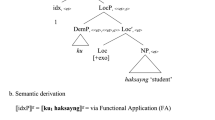Abstract
Contextualists about knowledge ascriptions perceive an analogy between the semantics they posit for “know(s)” and the semantics of comparative terms like “tall” and “flat”. Jason Stanley has recently raised a number of objections to this view. This paper offers a response by way of an alternative analogy with modified comparatives, which resolves most of Stanley’s objections. Rather than being ad hoc, this new analogy in fact fits better with platitudes about knowledge and facilitates a better understanding of the semantics of gradability, such that an explanation of most of Stanley’s disanalogies becomes available. In addition, I argue that there are reasons to doubt Stanley’s claim that “knows(s)” cannot switch its content within a discourse, due to what may happen when we ascribe knowledge of more than one proposition.
Similar content being viewed by others
References
Cappelen, H. & Lepore, E. (2005). Insensitive Semantics. Blackwell, Oxford
Cohen S. (1999). ‘Contextualism, Skepticism and the Structure of Reasons’. Philosophical Perspectives 13: 57–89
Cohen S. (2005). ‘Knowledge, Speaker and Subject’. The Philosophical Quarterly 55: 199–212
DeRose K. (1992). ‘The Context Sensitivity of Knowledge Attributions’. Philosophy and Phenomenological Research 52: 913–929
DeRose K. (1995). ‘Solving the Skeptical Problem’. The Philosophical Review 104: 1–52
Lewis D. (1996). ‘Elusive Knowledge’. Australasian Journal of Philosophy 74: 49–533
Ludlow, P. (2005): ‘Contextualism and the New Linguistic Turn in Epistemology’, in Peter and Preyer (eds.), Contextualism in Philosophy: Knowledge, Meaning and Truth, Oxford: Oxford University Press
Stanley J. (2004). ‘On the Linguistic Basis for Contextualism’. Philosophical Studies 119: 19–146
Richard M. (2004). ‘Contextualism and Relativism’. Philosophical Studies 119: 15–242
Unger P. (1984). Philosophical Relativity. Oxford University Press, Oxford
Author information
Authors and Affiliations
Corresponding author
Additional information
An earlier version of this paper was presented at the 2004 Graduate Student Philosophy Conference, Brown University, and I’d like to thank the organisers and participants, especially Ben Jarvis, my commentator. I’m also grateful to participants in a graduate seminar at Sheffield university and to Jenny Saul for useful comments on subsequent drafts.
Rights and permissions
About this article
Cite this article
Halliday, D. Contextualism, comparatives and gradability. Philos Stud 132, 381–393 (2007). https://doi.org/10.1007/s11098-005-2532-x
Published:
Issue Date:
DOI: https://doi.org/10.1007/s11098-005-2532-x




